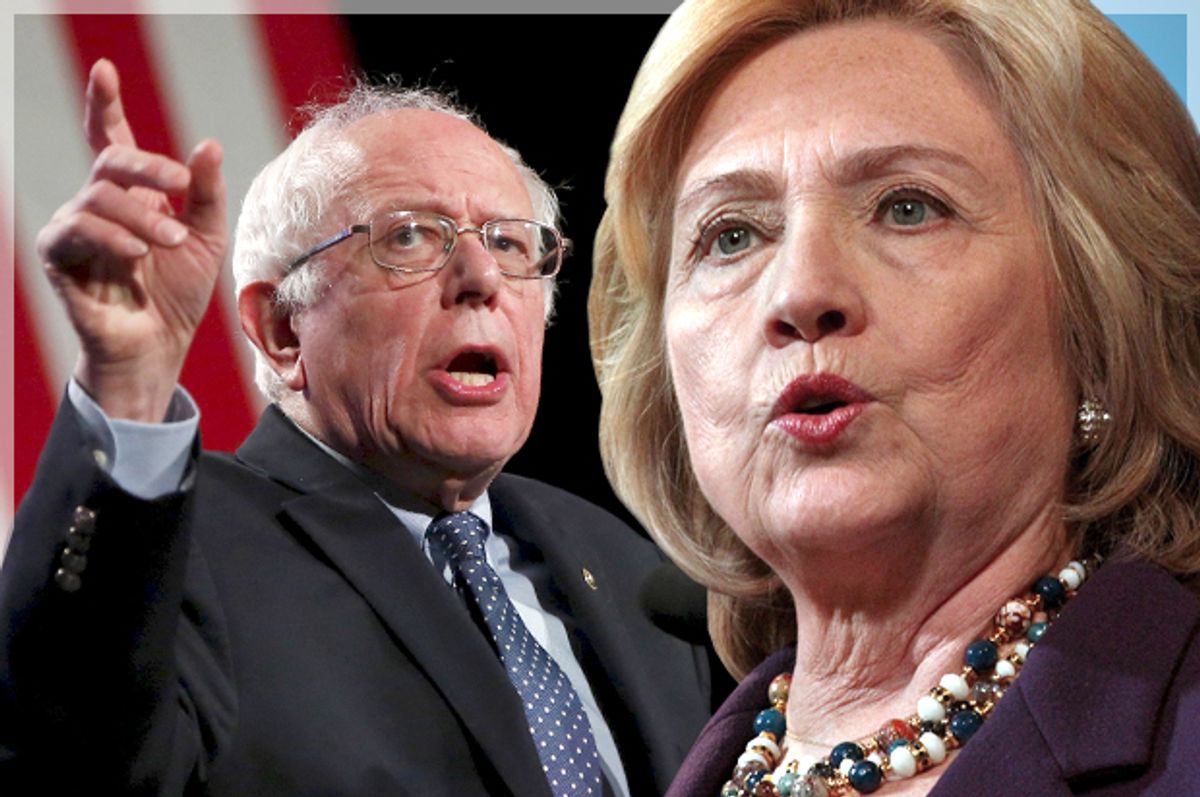 After three primary battles, Bernie Sanders and Hillary Clinton are tied in pledged delegates, or delegates that are decided by the voters, 51-51, and due to New Hampshire’s open primary that Sanders won overwhelmingly, he leads the “popular vote” 60% to 40%. But one wouldn’t know that after a cursory glance at the delegate count of media sources including ABC News, NPR, Chicago Tribune and the New York Times:
After three primary battles, Bernie Sanders and Hillary Clinton are tied in pledged delegates, or delegates that are decided by the voters, 51-51, and due to New Hampshire’s open primary that Sanders won overwhelmingly, he leads the “popular vote” 60% to 40%. But one wouldn’t know that after a cursory glance at the delegate count of media sources including ABC News, NPR, Chicago Tribune and the New York Times:
When one googles “democratic delegate count” in google the default result gives a similar impression:
The reason for this is because most media, though certainly not all, are including what are called “superdelegates” or delegates awarded to party insiders who have thus far pledged their delegates to Hillary Clinton or Bernie Sanders. Given Clinton’s early “front-runner” status and deep connections within the party, it’s entirely logical why she would have such a considerable lead among the party elite, but it’s a precarious lead that, when presented without qualification, only serves to prejudice the voter into thinking Clinton’s lead is insurmountable.
The reality, as the Times' own report makes clear, is that these delegate totals are far from set in stone: "But superdelegates could switch candidates if Mr. Sanders is the overwhelming choice of regular voters."
Indeed, in 2008, a great number of superdelegates, having initially supported Clinton, flooded to Obama once he started to rack up major victories in the primary states. While such a scenario has yet to play out in 2016, why the media would present such an historically provisional total as something final is misleading. As several political pundits have pointed out, if Sanders were to begin racking up voter-allocated delegates, it would create a crisis in the party if the superdelegates usurped their wishes and selected Clinton in spite of her getting less votes. Absent a tie, as Jonathan Bernstein of Bloomberg notes, the superdelegates won’t decide the primary, and are thus far more psychological than material. All this essential context is lost in these simplistic graphs.
Big-name Sanders booster Mark Ruffalo cried foul Tuesday morning, tweeting, “Please set the record straight, 51 to 51 and not 502 to 70.” Other big-name Bernie supporters Michael Moore and Robert Reich also objected to the framing. Despite their partisan tone, they’re entirely right. How the media frames the horse race matters and how they're doing so now is very misleading.
Another major issue in the superdelegate-included totals, in addition to being objectively prejudicial, is that it plays into one of Clinton’s major selling points: inevitability. As the Nation’s Katrina vanden Heuvel put it on Twitter when objecting to the New York Times' use of superdelegates, it's an "inevitability watch." The reason she framed it this way makes sense to anyone who closely monitors the campaign; the impression that Clinton is the ordained favorite, the default nominee absent disaster, exists largely in the minds of pundits and party leaders. When the voters actually get to weigh in, as we’ve seen, Clinton and Sanders are roughly just as popular..
MSNBC Chris Hayes made a similar point, tweeting:
I think it's important to keep democratically earned delegates and super delegates separate in tallies. it's true, according to the DNC rules there's no difference between them. And it's also true HRC has hundreds pledged to her. But in the event that Sanders were to head towards the convention w more awarded delegates, I think it would provoke a pretty profound. small-d democratic crisis for the DNC to award the nom to HRC just on super Ds.
He’s on the right track, but this is a bit inadequate. Some media make difficult-to-understand color distinctions, but this is not something we can expect the average voter to parse. MSNBC and CNN, to their credit, have avoided publishing on their websites the lopsided superdelegate totals, vouching instead for state-by-state breakdowns.
The media’s job should not be to play into power-serving tropes. The average media consumer cannot be expected to make such nuanced distinctions while briefly looking at a graph. Scrolling past Twitter or flipping through the New York Times and seeing a graph that shows Clinton with a 7-to-1 lead gives the impression the election is all but over, which can only serve to undermine democracy and further perpetuate the undeserved "inevitable" narrative advanced by the Clinton camp.






Shares